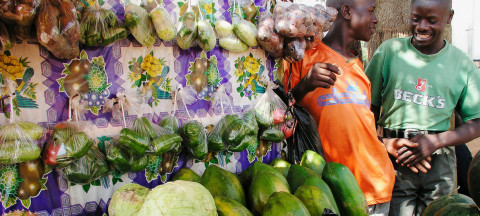
GCED Basic Search Form
Quick Search
Вы здесь
Новости

Unsafe food kills an estimated 420,000 people every year, the head of the World Health Organization (WHO) said on Thursday, just ahead of the first-ever UN World Food Safety Day. Children under-five are the most at risk, carrying 40 per cent of the foodborne disease burden, amounting to 125,000 deaths every year.
“These deaths are entirely preventable,” said Tedros Adhanom Ghebreyesus.
Unsafe food – contaminated by bacteria, viruses, parasites or chemical substances – also causes nearly one-in-ten people, or some 600 million, to fall ill globally each year.
“World Food Safety Day is a unique opportunity to raise awareness about the dangers of unsafe food with governments, producers, handlers and consumers”, he stated.
Just as food safety contributes to food security - human health, economic prosperity, agriculture, market access, tourism and sustainable development - unsafe food hinders these resources by straining health care systems and harming national economies, tourism, trade and development.
In many low- and middle-income economies, unsafe food that has caused workers to suffer illness, disability and premature death, costs $95 billion in productivity annually, WHO estimates.
Improving hygiene practices in the food and agricultural sectors helps to reduce the emergence and spread of antimicrobial resistance along the food chain and in the environment, the UN explained.
‘No food security without food safety’
The theme of this year’s first commemoration on Friday is that “food safety is everyone’s business”.
Cognizant of the urgent need to raise awareness, promote and facilitate actions for global food safety, the General Assembly decided to designate 7 June as World Food Safety Day.
The UN has designated WHO and the Food and Agriculture Organization (FAO) to lead efforts in promoting worldwide food safety.
Together they are joining forces to assist countries in preventing, managing and responding to risks along the food supply chain by working with food producers, vendors, regulatory authorities and civil society – regardless of whether food is domestically produced or imported.
“Whether you are a farmer, farm supplier, food processor, transporter, marketer or consumer, food safety is your business,” said FAO Director-General José Graziano da Silva. “There is no food security without food safety”.
The UN agencies underline that safe, nutritious and sufficient food is a key to promoting health and ending hunger, which are two of the main aims of the Sustainable Development Goals (SDGs).
To make a sustained difference to food safety:
- Governments must ensure safe and nutritious food for all.
- Agriculture and food producers need to adopt good practices.
- Business operators must safely prepare, transport and store food.
- Consumers need timely, clear and reliable information on nutritional- and disease-risks associated with their food choices.
- UN organizations, governments, regional bodies and the private sector must work together on food safety issues.
Safe food contributes to a healthy life and its production improves sustainability by enabling market access and productivity, which drives economic development and poverty alleviation, especially in rural areas.
Investing in consumer food safety education can potentially reduce foodborne disease and return savings of up to $10 for each dollar invested, according to the UN agencies.
Worldwide activities for World Food Safety Day are aiming to inspire action to help prevent, detect and manage foodborne health risks.
“From farm to plate, we all have a role to play in making food safe”, concluded the WHO chief.
URL:
